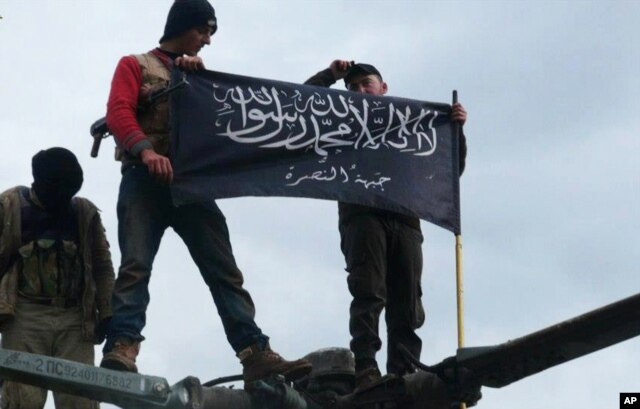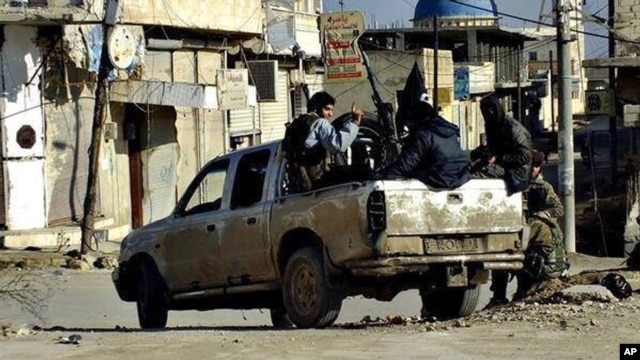
Georgian’s Death on Syria Battlefield Shows Jihadist Lure
Zaza Tsuladze
TBILISI, GEORGIA—When he left his village in Georgia, Beslan Mukhtarov seemed destined to be a doctor. He arrived in Turkey, and was admitted to a prestigious medical school in Istanbul.
But Mukhtarov’s life took a radical turn. According to Turkish security officials, Mukhtarov crossed into Syria last November and joined Jabhat al-Nusra, the al-Qaida-aligned Islamist group fighting against government forces in the Syrian civil war.
Mukhtarov was killed in December in a Russian airstrike near the Syrian-Turkish border.
At 30, he became the 17th citizen of Georgia to die in Syria. His relatives in Karajala, an ethnic Azeri village in eastern Georgia, were stunned.
«I talked to [his] father,» Mamed Suleimanov, a relative of Mukhtarov, told VOA’s Georgian Service. «He told me: ‘My son was studying in a Turkish university. Then I do not know what happened. He left for Syria, and now they say he’s dead.'»
Mukhtarov is one of dozens of Georgian nationals who have left the Caucasus region to join the Islamic cause in Syria and become aligned with Syrian rebels or Islamic State fighters.
Increasingly radical views
The recruits are often driven by a conservative Muslim ideology, while fleeing poverty in Georgia.
FILE – Rebels from al-Qaida-affiliated Jabhat al-Nusra, also known as the Nusra Front, wave their brigade flag, as they step on the top of a Syrian air force helicopter at Taftanaz air base, Jan. 11, 2013.
«The decision to fight in Syria or Iraq is highly personal and no single factor conclusively determines participation,» said Bennett Clifford, an analyst at the Tbilisi-based Georgian Foundation for Strategic and International Studies.
«Reports are mainly based on the word of mouth,» Clifford said. «Usually, it is impossible to determine whether the individual was fighting there until they are reported dead.»
Mukhtarov came from an Azeri area where young men are turning increasingly radical, analysts say.
Ethnic Azeris, the largest Muslim group in Georgia, are traditionally Shi’ite Muslims. But more and more young people are adopting Salafism — an ultra-conservative strain of Sunni Islam.
The religious divide, largely hidden from public view, is playing out in neighborhoods and families. Some radicalized sons will not go to the mosques that their fathers have attended for years.
«In some villages, we control one mosque, the Salafis control the other one,» Iasir Alyev, an ethnic Azeri who is the mufti of eastern Georgia, told VOA’s Georgian Service.
Promises of ‘paradise,’ money
Georgia’s Muslim leaders blame Salafism’s growing influence on young people on foreign-educated clerics, whose radical views of religion make young people increasingly vulnerable to IS recruitment.
«They’ve been told that if they die in Syria, they are going to paradise,» Alyev said. «There is no such paradise.»
«I know that recruiters promise them $15,000 as soon as they reach Syria, and people go thinking that they can send the money back to their families,» he said. «But it is always a lie. They never get money.»
Young people who leave Georgia for the Middle East often do not tell their relatives where they are going. Families don’t find out until it is too late, Alyev said.
FILE – This undated file image posted on a militant website Jan. 14, 2014, shows fighters from an al-Qaida-linked Islamic State militant group in Raqqa, Syria.
It took nearly two months for news of Mukhtarov’s death to reach his home in Georgia.
Mukhtarov’s story
Little is known as to how he ended up in a predominantly Turkmen territory in the Syrian province of Latakia. According to Turkish security officials, Mukhtarov crossed into Syria sometime in November 2015.
It is not clear whether Mukhtarov was an active combatant in Syria or was simply using his medical training to treat people wounded in the fighting there.
Mukhtarov was born and raised in Karajala, but left the eastern Georgian village for a better life in Turkey. According to Turkish media, he was admitted to Istanbul’s Cerrahpasa School of Medicine after earning top scores on state exams in Turkey.
Media reports say he came under the radar of Turkish law enforcement after criticizing both Israel and Fethullah Gulen, a dissident Turkish imam who resides in the U.S.
Turkish authorities reportedly labeled Mukhtarov a «suspected terrorist.» He was questioned by the Turkish police and eventually deported back to Georgia. He was banned from entering Turkey for four years, reports say.
Villagers in Georgia are reluctant to speak about Mukhtarov’s activities during those four years back home.
But the future doctor had no success in building a sustainable future, they say, and he died less than a month after reaching the Syrian war front.
VOA’s Fatima Tlisova contributed to this report.



